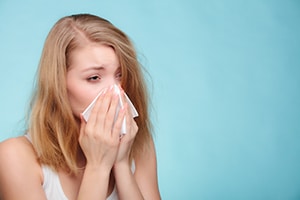Allergies are a common autoimmune condition. Allergies provoke overproduction of something called histamines. At Wake Ear, Nose & Throat Specialists & Wake Sinus Center, Dr. Pankaj Gupta tracks down allergic triggers with state-of-the-art testing and helps patients manage symptoms. He can help you feel better, too.
What signs show you have allergies

Allergic reactions happen when someone is exposed to an irritant, or allergen, which their bodies are particularly sensitive to. The allergen may be inhaled, touched, or ingested, producing common signs such as:
Skin redness and rashes (hives)
Itching
Sneezing
Coughing
Wheezing
Nausea and vomiting
Itchy, watery, puffy eyes
Common allergic triggers include dust, mold, animal dander, pollen, cigarette smoke, food, drugs, latex and more. Some reactions are mild to moderate. Others, such as those associated with insect vectors (bee stings), can be severe and life-threatening. These are called anaphylactic reactions and require immediate medical attention. Wheezing, extreme hives and even unconsciousness often accompany these extreme allergic responses.
Dealing with allergies
If you suspect you have allergies in one form or other, seek the advice of Wake Ear, Nose, and Throat Specialists and Wake Sinus Center in Cary for an allergy consultation with Dr. Gupta and his team of experts.
Dr. Gupta will review your symptoms, possible triggers and medical history. Often he performs in-office allergy testing in the form of pin tests (scratches on the skin which expose the body to minute amounts of possible allergens). Intradermal testing, injections of suspected allergen placed under the skin, is another method of honing in on allergic triggers and their severity.
Decongestants and antihistamine medications are common treatments for allergies. Allergy shots, desensitizing shots given at regular intervals, help control symptoms as well.
Of course, lifestyle adjustments can help, too. They may include:
Staying indoors on high pollen count days
Wearing a particle mask when doing housework or other dusty chores
Washing hands and face after coming in from the outdoors
Keeping a written log of symptoms, including foods you think you may be sensitive to
Taking your medicine with you to school, work, the gym and especially on vacation
The Asthma and Allergy Foundation of America states that one our of every five people in the United States have some form of allergies. So, you won’t be alone in pursuing treatment and making changes in your habits to help control them. Day to day life with allergies You can manage your allergies, and Dr. Gupta and his team are more than happy to help you. For an individualized consultation, please call Wake Ear, Nose, and Throat Specialists and Wake Sinus Center at (919) 851-5636.
